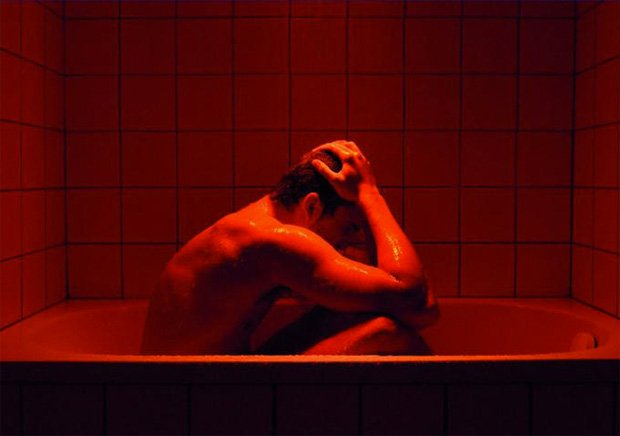Love reaction: Cannes 2015
Controversy king Gaspar Noé brings his explicit sex drama (in 3D) to the Cannes Film Festival. Here’s Jamie Graham’s reaction…
The most important thing in life is love, then sex. Combine the two by having sex with someone you love, and it is as good as the human experience can get.
This, paraphrased, is the belief of American-in-Paris Murphy (Karl Glusman), the aspiring filmmaker at the centre of Gaspar Noé’s semi-autobiographical cause célèbre. Murphy begins the movie by pleasuring the dark-haired Electra (Aomi Muyock) while she vigorously returns the favour, with the statically shot, unedited scene lasting several minutes until Murphy ejaculates. Then Noé cuts to Murphy awakening next to the blonde-haired Omi (Klara Kristin). They have a young son.
Over the next two-plus hours, Noé’s time-hopping narrative establishes how these two women came to be such an important part of Murphy’s life, and he theirs. As the titillating, taboo-busting promo posters and Noé’s Director’s Statement (‘I want to film that which cinema has rarely allowed itself, either for commercial or for legal reasons: the organic dimension of being in love’) promised, there is plenty of sex, though the ‘hardcore porn’ tag some have thrown around is a nonsense: Benoȋt Debie’s camera keeps a respectful distance (well, apart from one ‘inside-the-vagina’ shot that is, of course, CGI) and viewers are spared/denied any gynaecological detail or penetration shots; for once, more loving attention is granted to the male form, with a good deal of tumescence on show and at least two more money shots.

Of the many sex scenes (which soon reach a point of arousing tedium more than anything else), the most captivating is an early threesome between Murphy, Electra and Omi, their limbs entwining, loosening and reconfiguring with entrancing fluidity. Later, perhaps in an effort to spike interest after all the sucking and fucking hits spin-cycle, Noé guides Murphy and Electra into a sex club for some orgiastic pleasure. All infernal hues, pounding music and hungry lust, it echoes the club scenes in Irreversible.
Between the bonking, Murphy muses upon his emotions and life-philosophies, with many of his ruminations delivered in voiceover – thoughts that float out to the audience à la Terrence Malick movies. His ponderings are a good deal more commonplace than those in Lars von Trier’s Nymphomaniac, and a good deal more dull. “I am stupid. A dick. A dick doesn’t have brains…” is a fairly standard example, and viewers can only be thankful that Gaspar’s gasper at least has beautiful form to distract from the content: glorious match cuts pepper the entire movie and frequent fades to black provide an ominous edge, while Debie’s heavily filtered lensing and choice of angles is always arresting.
Too long at 135 minutes and with its fractured time scheme proving a hard-to-follow mess, Love’s efforts to find heart and soul are further hamstrung by the choice to film in the English language. Intonation is off, rending performances hollow, and it follows that courageous moments in which Noé hangs his past/inner life on the screen to be examined by all, just seem silly. When Murphy suggests to Omi that they call their son Gaspar, the audience roared; when an art dealer is introduced as Noé, they roared again.
Sign up for the Total Film Newsletter
Bringing all the latest movie news, features, and reviews to your inbox
Of course, any new Noé movie has to be seen and there are indelible sequences here that only he could have fashioned. But coming (ahem) after I Stand Alone, Irreversible and Enter The Void, this just feels rather limp.
The Total Film team are made up of the finest minds in all of film journalism. They are: Editor Jane Crowther, Deputy Editor Matt Maytum, Reviews Ed Matthew Leyland, News Editor Jordan Farley, and Online Editor Emily Murray. Expect exclusive news, reviews, features, and more from the team behind the smarter movie magazine.


